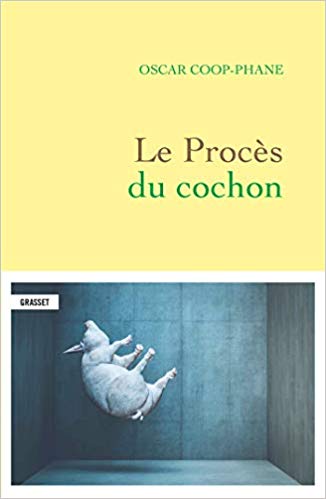THE PIG’S TRIAL
Oscar Coop-Phane
(Grasset, 128 pages, 2019)
Somewhere in the distant past, a creature wanders out of the woods into a sunny garden, and finds a sleeping infant left unattended in a wicker basket. On impulse, the creature chews off the baby’s tender cheeks and shoulder. The child dies and the killer is caught and brought to trial. But how can a pig—for pig it is!—face up to the law of men? Inspired by true historical events, Oscar Coop-Phane lays bare the passions and sentiments underpinning the wheels of justice. In this allegorical tale, the monster may not be who you think.
The novel retraces the demise of the pig in four soberly titled chapters: “The Crime,” “The Trial,” “The Wait,” and “The Torture.” Quickly caught, the swine is thrown in jail. His assigned lawyer, the conscientious Hector Barbin, has never had to defend a criminal like this one before but is nonetheless determined to do his best. In the meantime, the “Cheeks Biter,” as the beast is now called, settles peaceably in jail, properly fed and protected from the elements. While the pig enjoys a taste of human existence, his fellow prisoners are routinely brought down to the level of animals.
Presented in the terse format of a play, the trial begins: the laying down of facts, the stream of witnesses, the damning presentation of evidence. For the prosecutor, the remorseless culprit embodies the essence of evil, down to its repulsive stench. Mr. Barbin rests his case with a crafty bit of lawyering, but his efforts are in vain. As the judge carefully ponders the details—and the symbolism—of the execution, preparations have already been made.
Enter now the actors whose role is to ensure the smooth functioning of justice: the men who will guide the convict to the scaffold, Jean the Executioner and Paul the Priest. The villagers rejoice at the prospect of a good spectacle. The pig meets a grotesque and cruel end in front a cohort of other pigs brought in so the guilty one can set an example. Which is more gruesome, the crime or the punishment, the violent bestiality of the Cheeks Biter or the monstrous inhumanity of Jean the Executioner?
In the epilogue, Coop-Phane evokes a medieval game, a burlesque encounter that consists of bringing blind men into an arena together with a pig. They must try to strike the animal so as to be able to claim it. Coop-Phane leaves the reader to draw his or her own conclusions. With incisive limpidity, he distills the essence of a mechanism to better highlight its blind spots. Inspired by Michel Foucault and Franz Kafka, The Pig’s Trial is a strikingly original and powerful novel by a brilliant young writer.
Oscar Coop-Phane (born 1988) has published five novels, two of which have been translated into English: his acclaimed debut novel Zenith Hotel, which won the Prix de Flore in 2012, and Tomorrow Berlin, both published by Arcadia Books (2016). Additionally he has published Octobre (Editions Finitude, 2014) and Mâcher la poussière (Grasset, 2017). Since 2013, he also has been writing columns for the French version of Vanity Fair.

